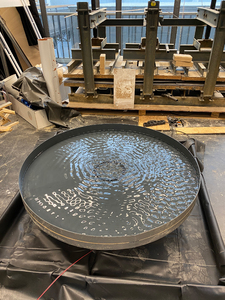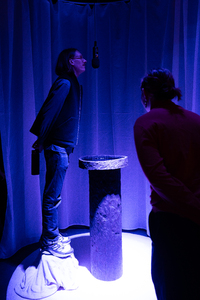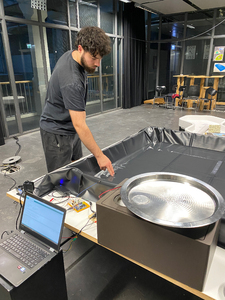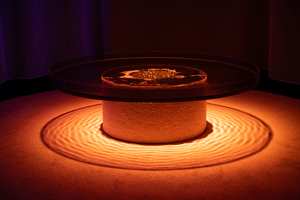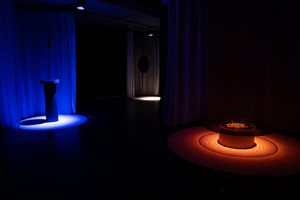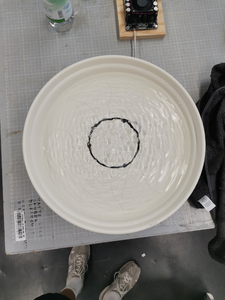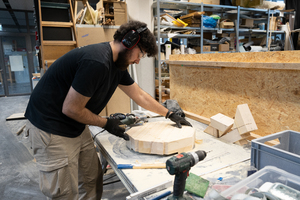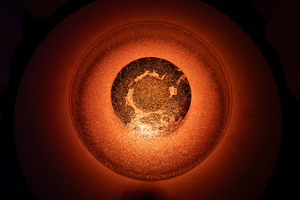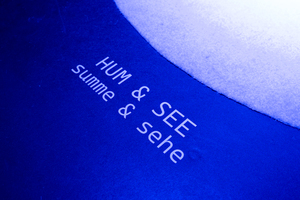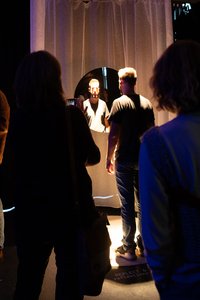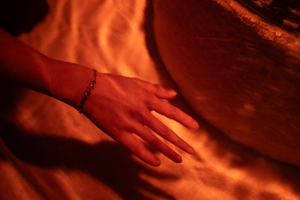HfG
Alle Inhalte mit Metadaten des Vokabulars "HfG". Sie sehen nur Inhalte, für die Sie berechtigt sind.
2756 Inhalte
- Seite 1 von 230
Bilder Prozess
- Titel
- Bilder Prozess
- Autor/in
- Schlagworte
- Datierung
- 24.10.2024
- Titel
- Bilder Prozess
- Titel (en)
- Images Process
- Urheberrechtshinweis
- © Joshua Weber
- Rechtsschutz/Lizenz
- Freigabe Nutzung HfG
- Medienersteller/in
- Beziehung/Funktion
- Medien-Beschreibung
- Bilder der Experimente und der Herstellung der Objekte
- Medien-Beschreibung (en)
- Pictures of the experiments and the production of the objects
- Alternativ-Text (de)
- Bilder der Experimente und der Herstellung der Objekte
- Alternativ-Text (en)
- Pictures of the experiments and the production of the objects
- Projektleiter/in
- Semester
- Studiengang
- Typ der Abschlussarbeit
- Importiert am
- 03.11.2024
- Übergeordnete Sets
- 1
Bilder Ausstellung
- Titel
- Bilder Ausstellung
- Autor/in
- Kategorie
- Schlagworte
- Datierung
- 24.10.2024
- Titel
- Bilder Ausstellung
- Titel (en)
- Images exhibition
- Urheberrechtshinweis
- © Joshua Weber
- Rechtsschutz/Lizenz
- Freigabe Nutzung HfG
- Medienersteller/in
- Beziehung/Funktion
- Medien-Beschreibung
- Die Objekte der Ausstellung und ihr Erlebnis
- Medien-Beschreibung (en)
- The objects of the exhibition and the experience
- Projektleiter/in
- Semester
- Studiengang
- Typ der Abschlussarbeit
- Importiert am
- 03.11.2024
- Übergeordnete Sets
- 1
Bilder Prozess
- Titel
- Bilder Prozess
- Autor/in
- Schlagworte
- Datierung
- 24.10.2024
- Titel
- Bilder Prozess
- Titel (en)
- Images Process
- Urheberrechtshinweis
- © Joshua Weber
- Rechtsschutz/Lizenz
- Freigabe Nutzung HfG
- Medienersteller/in
- Beziehung/Funktion
- Medien-Beschreibung
- Bilder der Experimente und der Herstellung der Objekte
- Medien-Beschreibung (en)
- Pictures of the experiments and the production of the objects
- Alternativ-Text (de)
- Bilder der Experimente und der Herstellung der Objekte
- Alternativ-Text (en)
- Pictures of the experiments and the production of the objects
- Projektleiter/in
- Semester
- Studiengang
- Typ der Abschlussarbeit
- Importiert am
- 03.11.2024
- Übergeordnete Sets
- 1
Bilder Ausstellung
- Titel
- Bilder Ausstellung
- Autor/in
- Kategorie
- Schlagworte
- Datierung
- 24.10.2024
- Titel
- Bilder Ausstellung
- Titel (en)
- Images exhibition
- Urheberrechtshinweis
- © Joshua Weber
- Rechtsschutz/Lizenz
- Freigabe Nutzung HfG
- Medienersteller/in
- Beziehung/Funktion
- Medien-Beschreibung
- Die Objekte der Ausstellung und ihr Erlebnis
- Medien-Beschreibung (en)
- The objects of the exhibition and the experience
- Projektleiter/in
- Semester
- Studiengang
- Typ der Abschlussarbeit
- Importiert am
- 03.11.2024
- Übergeordnete Sets
- 1
Bilder Ausstellung
- Titel
- Bilder Ausstellung
- Autor/in
- Kategorie
- Schlagworte
- Datierung
- 24.10.2024
- Titel
- Bilder Ausstellung
- Titel (en)
- Images exhibition
- Urheberrechtshinweis
- © Joshua Weber
- Rechtsschutz/Lizenz
- Freigabe Nutzung HfG
- Medienersteller/in
- Beziehung/Funktion
- Medien-Beschreibung
- Die Objekte der Ausstellung und ihr Erlebnis
- Medien-Beschreibung (en)
- The objects of the exhibition and the experience
- Projektleiter/in
- Semester
- Studiengang
- Typ der Abschlussarbeit
- Importiert am
- 03.11.2024
- Übergeordnete Sets
- 1
Ausstellungskomposition
- Titel
- Ausstellungskomposition
- Autor/in
- Kategorie
- Schlagworte
- Datierung
- 24.10.2024
- Titel
- Ausstellungskomposition
- Titel (en)
- Exhibition composition
- Urheberrechtshinweis
- © Joshua Weber
- Rechtsschutz/Lizenz
- Freigabe Nutzung HfG
- Medienersteller/in
- Beziehung/Funktion
- Medien-Beschreibung
- Die Objekte der Ausstellung und ihr Erlebnis
- Medien-Beschreibung (en)
- The objects of the exhibition and the experience
- Projektleiter/in
- Semester
- Studiengang
- Typ der Abschlussarbeit
- Importiert am
- 03.11.2024
- Übergeordnete Sets
- 1
Bilder Prozess
- Titel
- Bilder Prozess
- Autor/in
- Schlagworte
- Datierung
- 24.10.2024
- Titel
- Bilder Prozess
- Titel (en)
- Images Process
- Urheberrechtshinweis
- © Joshua Weber
- Rechtsschutz/Lizenz
- Freigabe Nutzung HfG
- Medienersteller/in
- Beziehung/Funktion
- Medien-Beschreibung
- Bilder der Experimente und der Herstellung der Objekte
- Medien-Beschreibung (en)
- Pictures of the experiments and the production of the objects
- Alternativ-Text (de)
- Bilder der Experimente und der Herstellung der Objekte
- Alternativ-Text (en)
- Pictures of the experiments and the production of the objects
- Projektleiter/in
- Semester
- Studiengang
- Typ der Abschlussarbeit
- Importiert am
- 03.11.2024
- Übergeordnete Sets
- 1
Bilder Prozess
- Titel
- Bilder Prozess
- Autor/in
- Schlagworte
- Datierung
- 24.10.2024
- Titel
- Bilder Prozess
- Titel (en)
- Images Process
- Urheberrechtshinweis
- © Joshua Weber
- Rechtsschutz/Lizenz
- Freigabe Nutzung HfG
- Medienersteller/in
- Beziehung/Funktion
- Medien-Beschreibung
- Bilder der Experimente und der Herstellung der Objekte
- Medien-Beschreibung (en)
- Pictures of the experiments and the production of the objects
- Alternativ-Text (de)
- Bilder der Experimente und der Herstellung der Objekte
- Alternativ-Text (en)
- Pictures of the experiments and the production of the objects
- Projektleiter/in
- Semester
- Studiengang
- Typ der Abschlussarbeit
- Importiert am
- 03.11.2024
- Übergeordnete Sets
- 1
Bilder Ausstellung
- Titel
- Bilder Ausstellung
- Autor/in
- Kategorie
- Schlagworte
- Datierung
- 24.10.2024
- Titel
- Bilder Ausstellung
- Titel (en)
- Images exhibition
- Urheberrechtshinweis
- © Joshua Weber
- Rechtsschutz/Lizenz
- Freigabe Nutzung HfG
- Medienersteller/in
- Beziehung/Funktion
- Medien-Beschreibung
- Die Objekte der Ausstellung und ihr Erlebnis
- Medien-Beschreibung (en)
- The objects of the exhibition and the experience
- Projektleiter/in
- Semester
- Studiengang
- Typ der Abschlussarbeit
- Importiert am
- 03.11.2024
- Übergeordnete Sets
- 1
Bilder Ausstellung
- Titel
- Bilder Ausstellung
- Autor/in
- Kategorie
- Schlagworte
- Datierung
- 24.10.2024
- Titel
- Bilder Ausstellung
- Titel (en)
- Images exhibition
- Urheberrechtshinweis
- © Joshua Weber
- Rechtsschutz/Lizenz
- Freigabe Nutzung HfG
- Medienersteller/in
- Beziehung/Funktion
- Medien-Beschreibung
- Die Objekte der Ausstellung und ihr Erlebnis
- Medien-Beschreibung (en)
- The objects of the exhibition and the experience
- Projektleiter/in
- Semester
- Studiengang
- Typ der Abschlussarbeit
- Importiert am
- 03.11.2024
- Übergeordnete Sets
- 1
Bilder Ausstellung
- Titel
- Bilder Ausstellung
- Autor/in
- Kategorie
- Schlagworte
- Datierung
- 24.10.2024
- Titel
- Bilder Ausstellung
- Titel (en)
- Images exhibition
- Urheberrechtshinweis
- © Joshua Weber
- Rechtsschutz/Lizenz
- Freigabe Nutzung HfG
- Medienersteller/in
- Beziehung/Funktion
- Medien-Beschreibung
- Die Objekte der Ausstellung und ihr Erlebnis
- Medien-Beschreibung (en)
- The objects of the exhibition and the experience
- Projektleiter/in
- Semester
- Studiengang
- Typ der Abschlussarbeit
- Importiert am
- 03.11.2024
- Übergeordnete Sets
- 1
Bilder Ausstellung
- Titel
- Bilder Ausstellung
- Autor/in
- Kategorie
- Schlagworte
- Datierung
- 24.10.2024
- Titel
- Bilder Ausstellung
- Titel (en)
- Images exhibition
- Urheberrechtshinweis
- © Joshua Weber
- Rechtsschutz/Lizenz
- Freigabe Nutzung HfG
- Medienersteller/in
- Beziehung/Funktion
- Medien-Beschreibung
- Die Objekte der Ausstellung und ihr Erlebnis
- Medien-Beschreibung (en)
- The objects of the exhibition and the experience
- Projektleiter/in
- Semester
- Studiengang
- Typ der Abschlussarbeit
- Importiert am
- 03.11.2024
- Übergeordnete Sets
- 1
